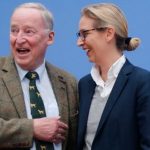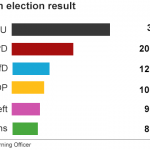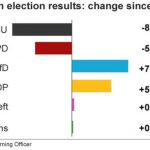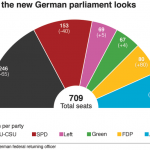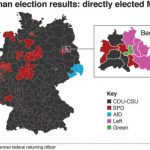German election: AfD vows to fight ‘invasion of foreigners’
Germany’s right-wing, nationalist AfD party has vowed to fight “an invasion of foreigners” into the country, after winning its first parliamentary seats.
“We want a different policy,” co-leader Alexander Gauland said following the historic surge.
But splits have already emerged between AfD leaders on the party’s direction.
Chancellor Angela Merkel has been re-elected for a fourth term but her conservative CDU/CSU bloc received its worst result in almost 70 years.
Mrs Merkel is beginning negotiations to form a new coalition government.
Her bloc’s current coalition partners, the Social Democrats (SPD), say they will go into opposition after historic losses. But Chancellor Merkel said she would still approach them for talks, in addition to the liberal Free Democrats (FDP) and the Greens.
AfD’s campaign capitalised on a backlash over Mrs Merkel’s decision to open Germany’s borders to undocumented migrants and refugees in 2015, mainly from the Middle East.
Its success has shocked Germany’s political establishment, and protests against the anti-Islam party have been held in several cities following the election result.
“One million people, foreigners, being brought into this country are taking away a piece of this country and we as AfD don’t want that,” Mr Gauland told a news conference on Monday.
“We say I don’t want to lose Germany to an invasion of foreigners from a different culture. Very simple.”
He said AFD (Alternative for Germany) – which is expected to take 94 seats in the 709-seat federal parliament as the third-largest party – had been elected “to uncompromisingly address” immigration issues.
But discord is already evident in the party – with another leader, Frauke Petry, declaring at the same news conference she would not join AfD’s parliamentary group despite winning a seat, before abruptly leaving the room to the surprise of other leaders.
Ms Petry, who is the best-known AfD figure, said there was “disagreement over content” in the party.
The move is a sign that having won her own seat and led the party to a strong result, Ms Petry is feeling confident enough to mould it in her own image, the BBC’s Damien McGuinness in Berlin says.
She wants to make AfD more moderate and tone down its nationalist rhetoric, he adds.
What does the result mean for Mrs Merkel?
While her bloc remains the largest in the Bundestag, the lower house of parliament, it is the worst result for the alliance between the Christian Democrats (CDU) and the Christian Social Union (CSU) since 1949, when national elections were held in Germany for the first time after World War Two.
Addressing supporters, Mrs Merkel, who has been in the job for 12 years, said she had hoped for a “better result” but later added: “We have a clear mission to govern.”
She added that she would listen to the “concerns, worries and anxieties” of AfD voters – one million of whom she said deserted her party – in order to win them back.
“I want to look for the conversation in order to tackle hate and rage, but there are some people who don’t want to listen to anything at all at the moment. We have to accept that,” she said on Monday.
A chaotic day for German politics
Jenny Hill, BBC News, Berlin
It has been a long and bruising election campaign. Angela Merkel may have won the election but it does not feel like much of a victory.
This election will go down in the history books for two reasons. Mrs Merkel may have won a fourth term but it is her worst-ever general election result. And right-wing nationalists are now part of the German establishment.
The result is a verdict, perhaps, on Mrs Merkel’s decision to open Germany’s doors to one million refugees.
What are her coalition options?
The SPD had their worst election result in the post-war era. The party’s loss of support while junior partner in government saw leader Martin Schulz declare on Sunday evening the end of the “grand coalition” with Mrs Merkel’s alliance, to cheers and applause.
He recognised it was a “bitter day” for the Social Democrats but vowed to prevent AfD from being the main opposition party and enjoying certain privileges as a result.
The SPD was given “a mandate to be a strong opposition in this country; a mandate to defend democracy in this country against all of those who question and attack it”,
The process of forming a new coalition could take months.
With the SPD out of play, the most likely scenario is a “Jamaica” coalition, so-called because of the colours of Jamaica’s flag. It includes the black CDU/CSU, the yellow, business-friendly Free Democrats (FDP) – who are returning to parliament after a four-year hiatus with 80 seats – and the Greens (67 seats).
Election marks unprecedented shift
This combination could lead to prolonged horse-trading, as the Greens and FDP disagree on key policy issues.
All parties have rejected working with AfD.
Why did AfD gain support?
Alternative for Germany was founded in 2013 as an anti-euro party but later turned its focus to immigration and Islam.
It called for a ban on minarets and declared Islam incompatible with German culture. Several of its candidates have been linked to far-right remarks.
Those hardline positions helped it to win seats in 13 of Germany’s 16 state parliaments in the last few years.
Its election campaign posters carried messages such as “Stop Islamisation. Vote AFD” alongside images of women wearing burkas, and “Burkas? We stand for bikinis”.
The party’s federal election result was better than opinion polls had forecast.
It performed particularly well in what was formerly East Germany, taking 21.5% of the vote as the second most popular party.
In Saxony, AfD narrowly beat the CDU to come out on top with 27% of the vote. According to analysis by broadcaster ARD, the AfD vote was highest among 35-44 year-olds, at 16%, and lowest among those above the age of 70, at 7%.
Beatrix van Storch, one of the party’s leaders, told the BBC that the party would start parliamentary debates “on migration, Islam and ever closer union” within the EU.
German media’s ‘nightmare’
By BBC Monitoring
“Nightmare win for Merkel” was the headline in Germany’sbest-selling tabloid Bild, which published a picture of a tired-looking chancellor with her eyes shut.
Tanit Koch wrote in the paper that Merkel had “failed to ease concerns about crime and Islamisation”. She said these fears had existed long before the refugee crisis of 2015 but politicians were “too genteel” to address them and AfD had “harvested the fruit”.
Merkel’s refugee policy was also seen as a crucial factor by Ulf Poschardt in Berlin’s Die Welt broadsheet. He said that while it was “disastrous” that the “left opposition in the Bundestag” had not attacked the policy, the media were also to blame. “Broadcasts, articles and debates ignored many citizens,” he added.
Berlin’s left-wing Tageszeitung, meanwhile, focused on AfD leader Alexander Gauland with the headline “The rise of the scaremongers”.
“The retros, the racists – now they’re in,” was the paper’s warning. It said AfD would be provocative, as they would “spread anxiety and stoke aggression”.
As to Mrs Merkel forming a government with the Greens and the Liberals, ARD TV’s Thomas Baumann is sceptical, saying he cannot imagine what kind of “basic melody” such an alliance between ideologically different parties would produce.
IMAGES:
Frauke Petry (R), chairwoman of the anti-immigration party Alternative fuer Deutschland (AfD) poses next top candidates Alice Weidel and Alexander Gauland (L) before a news conference in Berlin, Germany, September 25, 2017Image copyrightREUTERS
Map showing where MPs were elected
Chart showing changes in parties’ votes since 2013 election
Opponents of the Alternative for Germany (AfD) protest against the result of the German electionImage copyright GETTY IMAGES
Image caption Protests have been held in several cities against the AfD
AfD leaders (from left): Alexander Gauland, Alice Weidel and Frauke Petry
For more on this story and video go to: http://www.bbc.com/news/world-europe-41384550


